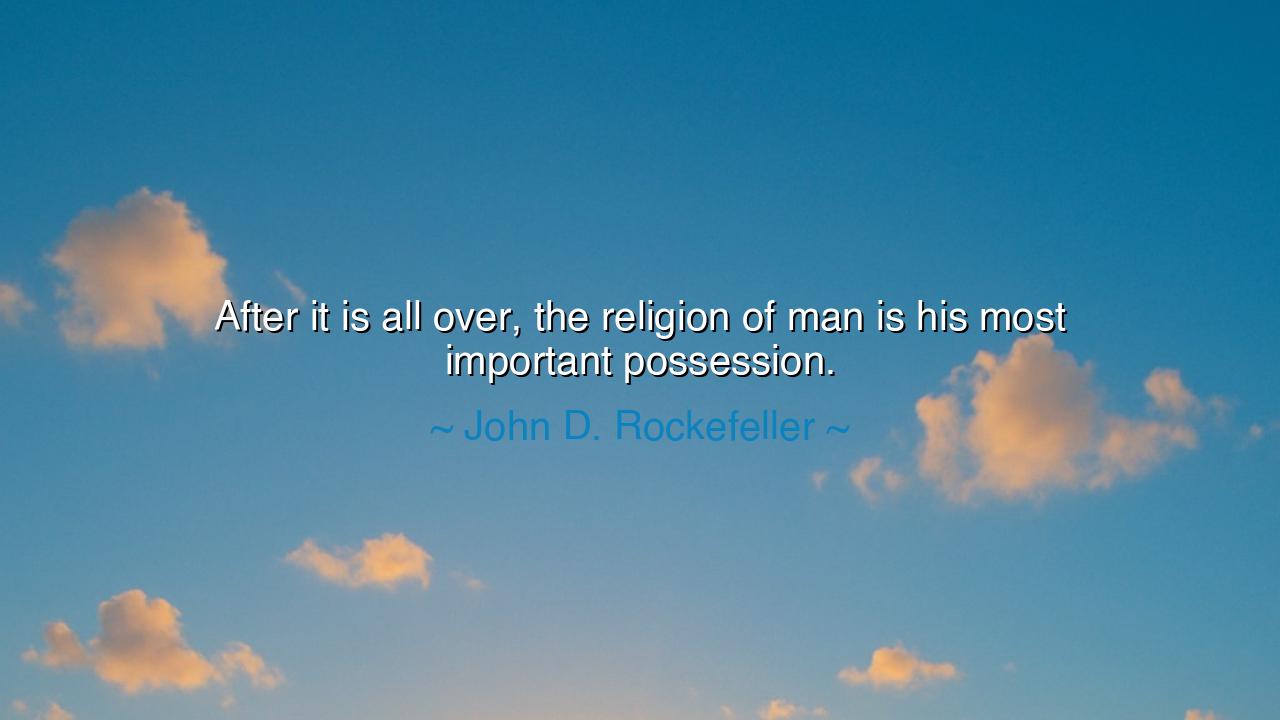
After it is all over, the religion of man is his most important






When the fires of ambition have burned low, when the trophies of success have lost their shine, and when the body grows weary beneath the weight of years, what remains to a man? It was then that John D. Rockefeller, the great titan of industry, looked beyond his towers of oil and gold and said: “After it is all over, the religion of man is his most important possession.” These are not the words of a preacher, but of one who held the world in his hands — and found that all its treasures could not fill the silence of the soul. In that confession lies a timeless truth: that wealth fades, power wanes, but faith, whether in God, in virtue, or in the sacred order of things, endures beyond the grave.
To understand the depth of Rockefeller’s saying, one must hear the echo of his age. He lived in an era of rising industry and restless hearts, when men built empires from iron and oil, yet often forgot the unseen realm of spirit. Rockefeller, a man of immense means, discovered through toil and triumph that the body’s labors are but half of life. The religion of man — not merely creed or ceremony, but the guiding faith that orders his thoughts, governs his deeds, and gives meaning to his breath — is what remains when fortune crumbles. For when all is stripped away, what one believes becomes what one is.
Even the mightiest have bowed before this truth. Consider Marcus Aurelius, emperor of Rome, conqueror of lands, philosopher of the Stoic way. Surrounded by legions and luxury, he wrote by candlelight: “A man’s worth is measured by the worth of what he values.” When plague swept his empire and enemies rose against him, he did not cling to gold or pleasure. Instead, he turned inward, to his inner law, his religion of the mind — the belief that virtue, courage, and harmony with nature are greater than the fleeting empire of flesh. Like Rockefeller centuries later, he knew that when all is over, faith in something higher is man’s true inheritance.
The religion of man, as Rockefeller spoke it, is not bound to temples or denominations. It is the sacred compass within — that unseen flame by which we navigate the storms of life. For some, it is faith in the divine; for others, faith in love, justice, or the immortal beauty of truth. But without such a faith, the human spirit withers. Wealth without wisdom becomes greed. Power without conscience becomes tyranny. Knowledge without reverence becomes arrogance. Only the religious heart — humble before the mystery of life — can stand when the winds of fortune have passed.
Rockefeller, who spent his later years giving vast sums to education and medicine, understood this well. He had conquered commerce, yet sought to redeem the soul through service. His religion was not only in prayer, but in action — in stewardship, in gratitude, in the recognition that all one holds is lent by time. He saw that success, without moral foundation, is but a tower built on sand. Thus his words were not a sermon but a legacy, urging mankind to remember that the final measure of a life is not how much it has gained, but what it has believed and given.
Let the reader take this as counsel for their own path: build, strive, create — but do not forget the foundation of spirit. Seek wealth if you must, but not at the cost of wonder. Let your daily labors be prayers, your integrity an offering. In moments of triumph, give thanks; in moments of loss, trust that meaning yet abides. For the religion of man — his faith in the good, the true, the eternal — is the only treasure that cannot be taxed, stolen, or burned.
So when the end comes — as it comes to all — and the lights of the world dim, what will remain is not the house you built nor the coins you gathered, but the faith that dwelt in your heart and guided your hand. Guard it well, nurture it with honesty and compassion, and it shall carry you beyond the final sunset. For as Rockefeller, once the richest of men, came to see: After it is all over, the religion of man is indeed his most important possession.






AAdministratorAdministrator
Welcome, honored guests. Please leave a comment, we will respond soon